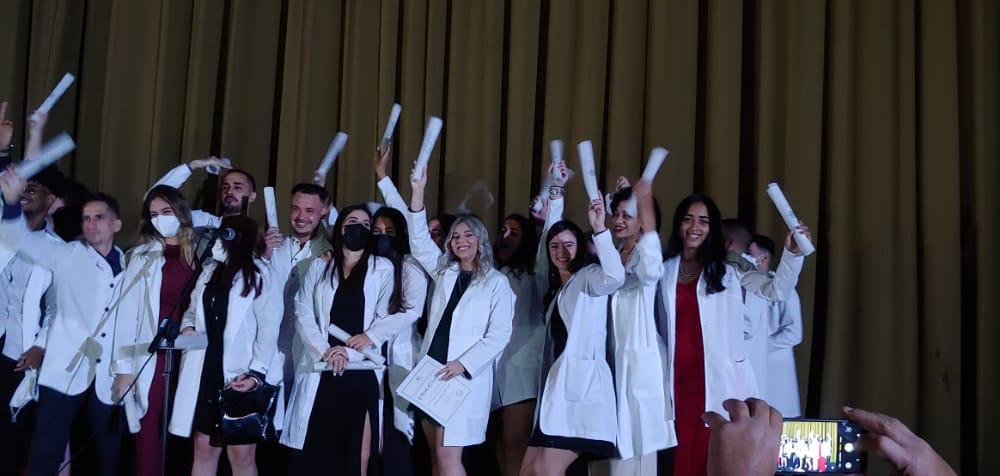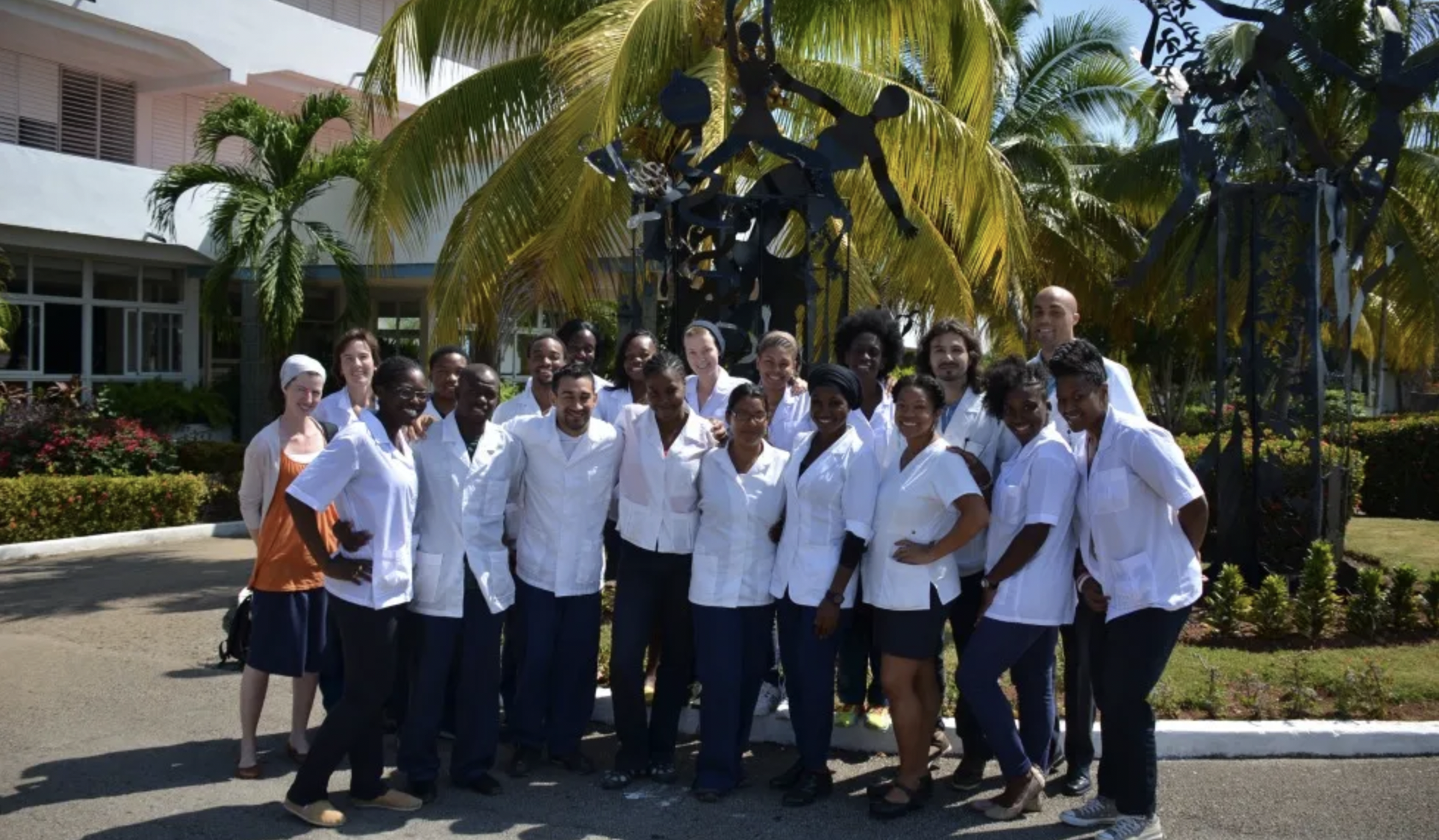
February 2025Study Medicine in the Republic of Cuba
Start your Doctor of Medicine journey
Reach us through
Take action and…
History of medical success since 1726
From pioneering yellow fever vaccines to exporting doctors globally, embodying healthcare as a human right.
Best education system in Latin America and the Caribbean
According to The World Bank
96% of Cuban medical students pass the United States Medical Licensing Examination (USMLE) Step 1 on their first attempt.
High-level teaching faculty
According to The World Bank
The only country on the continent to have a high-level teaching faculty.
Now the question is...
Why the University of Medical Sciences of Havana (UCMH)
Medical program’s recognition and accreditation
- 285 years of medical education experience
- International accreditation by the International Evaluation and Accreditation Council of the Union of Universities of Latin America and the Caribbean (UDUAL).
- Graduates are eligible to apply to ECFMG
- Registered in the World Directory of Medical Schools (World Directory)
- 13 Faculties, 12 medical careers, and extensive list of postgraduate programs
- 82 Polyclinics, 1693 Family Physician’s Office, 28 Maternity Homes, 12 Research Institutes, 51 hospital institutions, 38 pharmacies, 54 Stomatology Clinics and Services, 18 ophthalmology clinics.
- 96% of Cuban medical students pass the United States Medical Licensing Examination (USMLE) Step 1 on their first attempt.


First-year accommodation
Cuba's medical education system is renowned for its quality and affordability, and as such, universities take great care to ensure that students have comfortable living arrangements. Typically, first-year medical students are provided with on-campus or nearby off-campus housing options. These accommodations are designed to offer a safe and conducive environment for studying and personal growth.
Facility
- Fully furnished airconditioned apartments, including international TV channels package
- Wi-Fi services within the compound
- MLC store
- Electrical generators
- Garden snack bar/ BBQ area
- Swimming pools
- Gym
- Studying areas
- Common laundromat
Services
- Transportation to and from school
- Infirmary
- 24/7 security
- Spanish and pre-med tutorial classes (1-2 classes a week. CubaHeal Medical Tourism Inc offers this program
CUBAHEAL’S SERVICES:
Prior to and upon the student's arrival in the Republic of Cuba, CubaHeal Inc. takes charge of crucial logistical tasks. This comprehensive support system is designed to facilitate a seamless transition for students, allowing them to concentrate on their academic pursuits and immerse themselves in the vibrant educational and cultural opportunities that await in Cuba:
Prior to the student’s arrival:
Upon the Student’s Arrival:
Medical Curriculum
The Medicine degree was one of the 4 foundational degrees of the Royal and Pontifical University of San Jeronimo de La Habana. Since its inception 234 years ago and further extension of Medicines Sciences in 1962, Cuba boasts of the finest medical medication, with the University Of Medical Sciences Of Havana as the leading center in the country. Even so, Cuba is widely known for the highest levels of health care comparable to 1st world countries and punctuated by a superior and comprehensive medical service across all levels of care, from community health centers to the network of hospitals and specialized secondary and tertiary services, accessible free of charge by all Cubans.
Name: The Medicine degree
Curriculum organization: Semester–based except for one-year internship Program Length: Six years, with the first five made of ten semesters as academic period and one year of rotating internships. Admission requirements: Approved pre-university level Number of curricular units: 66 Academic degree: Medical Doctor Accreditation: Title of Medical Doctor
- The model of the professional or Professional Profile of the decree declared in the curriculum is a general practitioner
- The objective is to graduate general practitioners equipped to practice competently with robust scientific knowledge and provide medical care to pregnant women, adults, adolescents, children, as well as outpatients, families, and hospitalized patients through actions of health prevention, promotion, diagnosis, treatment and rehabilitation in the physical, psychological and social environments. They also perform educational, self-educational, administrative, and research actions alongside environmental health care.
- There are 4 areas of general competencies of the physician: Education, Research Administration, Comprehensive Medical care and Specialty
- The program defines 220 health problems identified and solved according to actions and 224 skills to be developed.
- The program promotes active learning methods, enhances cognitive independence and student protagonist. It offers a superior balance of theory and practice with an emphasis on group activities and activities related to the participation of students in health care processes (education at work). The program does not prioritize theoretical activities in the form of lectures, providing opportunities to students to focus on information research
- The amount of time for independent study and work in the first two years is 4 hours, increasing significantly from the 3rd year onwards. On average, self-study hours fluctuate between 15 and 30 hours per week.
- The performance of the day and night shifts from the 3rd year onwards with 6 to 8 hours per week as a mandatory minimum in on-call corps, intermediate, and intensive care units including Saturdays and Sundays with a more extended schedule (12 to 24 hours).
- The curriculum establishes extracurricular activities such as Knowledge Meetings, Award Exams, Student Assistantship Movement, Student Scientific Activity, and Special Attention to Student with outstanding academic performance, cultural sports, and recreational activities.
- To graduate, students must pass a National External State Examination, consisting of practice and a theoretical examination that proves the acquisition of the established professional competencies. To take the State Exam, students must have passed through practical and theoretical exams and 5 rotations of the internship.
Organization of the Medicine Degree Curriculum
The Medicine curriculum at UMCH consists of 66 curricular units including subjects, both elective and optional courses corresponding to a total of 10840 hours inclusive of 2784 hours of internship. The curriculum is based on active learning without prioritizing theoretical activities (laboratory classes, workshop classes, theoretical-practical activities, and seminars). It gives greater relevance to professional and clinical development in healthcare activities.
1-year Pre-Med Training
Non- Spanish speaking students begin with a mandatory 1-year pre-med training in addition to a standard 6-year program unless they show a mastery of the Spanish language demonstrated through a proficiency test. The purpose of this course is to equip the student with intense knowledge of the Spanish language relevant to focus on gaining a decent medical education quickly.
The Medicine degree curriculum program
1st year
*Contents of cell, prenatal development and basic tissues. ** Contents of integumentary system and osteomyoarticular system *** Contents of the nervous system **** Contents of endocrine regulation Note: The subject Medical Informatics can be taken in the first or second semester of the first year.
2nd Year
*Contents of blood, hemolymphopoietic system and cardiovascular system. ** Contents of the respiratory, renal and digestive systems. Note: The subject Research Methodology and Statistics can be taken in the first or second semester of this academic year.
3th Year
4th year
5th year
Rotating Internship
Study medicine in Havana/ Cuba, one of the safest, most beautiful cities in the Western hemisphere
Immerse yourself in historical charm and beautiful architecture as you step back in time. Havana was once considered the Queen Jewel of the Colonial empire, and while history has changed, the beauty and charm of this city is still something to behold. The four plazas that make up Old Havana are filled with brilliant architecture built of original but restored stone and seemingly painted by a rainbow. Among these plazas you’ll not only find several unique and fascinating museums, shops, and attractions, but you’ll also be mesmerized by St Christopher’s Cathedral, whose impressive bell towers seem to dominate the area. Located in the Plaza de la Cathedral, this piece of history is rumored to hold remains and relics of Christopher Columbus himself, and is rich in 18th century beauty.

